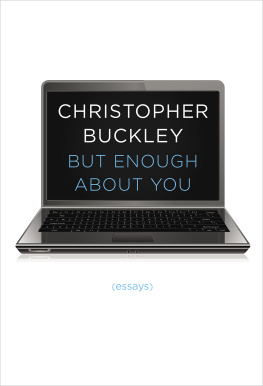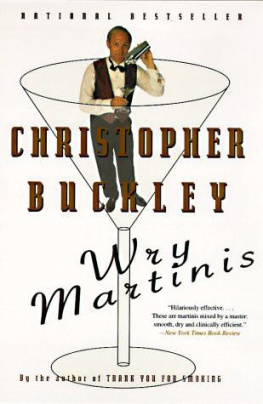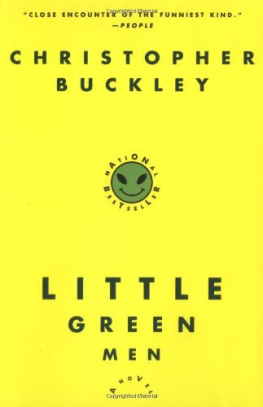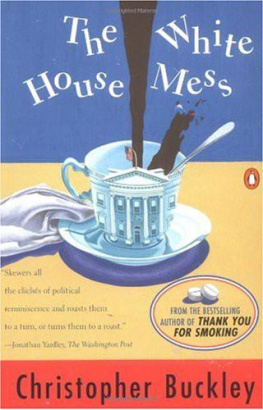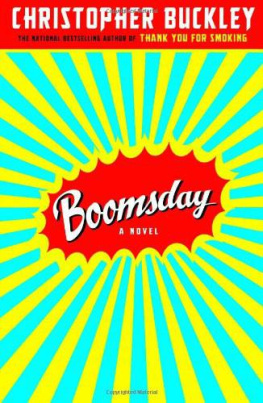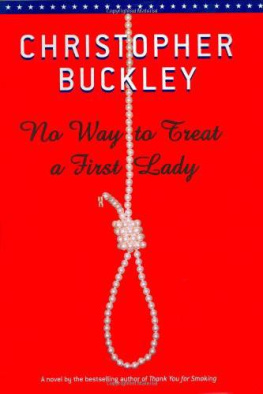ALSO BY CHRISTOPHER BUCKLEY
They Eat Puppies, Dont They?
Losing Mum and Pup: A Memoir
Supreme Courtship
Boomsday
Florence of Arabia
Washington Schlepped Here
No Way to Treat a First Lady
God Is My Broker
Little Green Men
Wry Martinis
Thank You for Smoking
Wet Work
Campion
The White House Mess
Steaming to Bamboola: The World of a Tramp Freighter

Simon & Schuster
1230 Avenue of the Americas
New York, NY 10020
www.SimonandSchuster.com
Copyright 2014 by Christopher Taylor Buckley
All rights reserved, including the right to reproduce this book or portions thereof in any form whatsoever. For information address Simon & Schuster Subsidiary Rights Department, 1230 Avenue of the Americas, New York, NY 10020.
First Simon & Schuster hardcover edition May 2014
SIMON & SCHUSTER and colophon are registered trademarks of Simon & Schuster, Inc.
Excerpt from Annus Mirabilis from THE COMPLETE POEMS OF PHILIP LARKIN by Philip Larkin, edited by Archie Burnett. Copyright 2012 by The Estate of Philip Larkin. Introduction copyright 2012 by Archie Burnett. Reprinted by permission of Farrar, Straus and Giroux, LLC.
Excerpt from Oysters from OPENED GROUND: SELECTED POEMS 19661996 by Seamus Heaney. Copyright 1998 by Seamus Heaney. Reprinted by permission of Farrar, Straus and Giroux, LLC.
The Simon & Schuster Speakers Bureau can bring authors to your live event. For more information or to book an event contact the Simon & Schuster Speakers Bureau at 1-866-248-3049 or visit our website at www.simonspeakers.com.
Jacket design by Jason Heuer
Jacket photograph by Edel/Shutterstock
Author photograph by Katy Close
Library of Congress Cataloging-in-Publication Data
Buckley, Christopher, 1952
[Essays. Selections]
But enough about you : essays / Christopher Buckley.First Simon & Schuster hardcover edition.
pages cm
Includes index.
I. Title.
PS3552.U3394B88 2014
814'.54dc23
2013019392
ISBN 978-1-4767-4951-8
ISBN 978-1-4767-4953-2 (ebook)
For
Christopher Hitchens
19492011
Faithful Old Body
Contents
Preface
Make [the reader] laugh, and he will think you a trivial fellow. But bore him the right way and your reputation is assured.
SOMERSET MAUGHAM
This irksome quote weighed on me as I cobbled together this collection. Ill willingly cop to being a trivial fellow, but I can say with a straight face that my goal has never been to bore the reader. Still, Mr. Maugham does have a point, blast him. Maybe Ive been going about this all wrong. But Im sixty-one now, so its a bit late in the game to be worrying about that.
Some years ago I found myself on a panel with Bruce McCall, Steve Martin, and Wendy Wasserstein, three nontrivial artists well known to Thalia, Muse of Comedy. I forget what exactly our topic was, but it must have had something to do with the business of trying to make people laugh. I do seem to recall that before long we were all whingeing about humors second-class status.
The nontrivial P. J. ORourke, one of the wittiest and smartest writers in the business, memorably remarked, Humor sits at the Childrens Table of Literature. Somewhere among P.J.s abundant trove of bon mots is his observation that Anyone can draw a crowd by standing up and shouting, I have cancer! But try doing it with forty-five minutes of stand-up. When P.J. got cancer some years later, I couldnt resist calling him up to say, Trying to draw a crowd, are we? Happily, the cancer is now gone for good, and even without it P.J. continues to draw big crowds.
During the panel discussion, Wendy Wasserstein said that someone had once condescendingly told her that she really ought to try serious writing instead of comedy. I said to him, Think writing funny is easy, do you? Really? You try it.
Well, only five paragraphs in and already wallowing in self-pity. We just cant get no respect. Its an old lament, and sometimes itself comic.
Toward the end of his life, Robert Benchley, one of the twentieth centurys great practitioners of literary humor, became obsessed with the idea of writing something serious. Making people laugheven to the point of reducing them to tearswas no longer enough for him. He had never wanted to be a mere funnyman. (His coinage, I believe, and no compliment.)
Benchley was a keen student of British history. He resolved to write a book on the Queen Anne era of early eighteenth-century Britain, when the Enlightenment was popping up everywhere like spring bluebells. According to his biographer, this would be nothing less than a new, analytical history. Benchley amassed a library of one hundred books on the subject. Periodically, he would seal himself off in a hotel room with his secretary, a former hatcheck girl, to work on his elusive masterwork. (For the purpose of scholarship, not shenanigans, though to be sure Mr. Benchley was no stranger to those.)
His new analytical history did not eventuate. Theres an amusing and telling quote in the biography courtesy of his son Nathaniel Benchley, author of a little novel called The Off-Islanders that became the basis for the movie The Russians Are Coming! The Russians Are Coming! Nathaniels son Peter wrote a monster best seller about a vengeful shark, providing the Benchley dynasty with a trifecta.
Nathaniel notes that his dad was hampered in his quest to write history by a scholarly version of obsessive-compulsive behavior. If he came across some informational lead, he had to follow it, wherever it went. And then had to follow that, wherever it led. And so on. At dawn he was still awake, the floor littered with books, determinedly reading some passage in a volume totally unrelated to the Queen Anne era. Lucky for him he lived before the Age of Google.
As for the bottom line: his biographer posits that Benchleys Scheherazade-style research kept him from having to confront the fear that often gnaws at those who find themselves bearing the mantle of humoristthat, when the chips were down, he would find himself unable to write adequately on a serious topic.
More on that mantle of humorist in a moment. Meanwhile, my own theory is that most humoriststo use that awful wordfind their way to Thalias workshop after discovering themselves incompetent in other, more practical professions. (Cosmetic surgery, personal injury law, gun industry lobbying, etc.)
Benchleys career as a student at Harvard inclines me to this insight. He had to sit for a final exam in which he was asked to discuss the arbitration of the international fisheries problem in respect to hatcheries, protocol, and dragnet and travel procedure as it affects (a) the point of view of the United States and (b) the point of view of Great Britain.
Benchley stared at the question, then took up his pencil and wrote, I know nothing about the point of view of Great Britain in the arbitration of the international fisheries problem and nothing about the point of view of the United States. Therefore, I shall discuss the question from the point of view of the fish. I like to think he got an A, but those Harvard profs can be sticklers.
As to mantle of humorist. Mantle seems, gosh, an awfully grand term. In the pages of this book, I cite a New Yorker cartoon in which a Washington, D.C., politician scowls at his secretary as she approaches his desk, holding in outstretched arms a folded garment.
No, no, Miss Clark! I asked you to bring in the Mantle of Greatness, not the Cloak of Secrecy.

